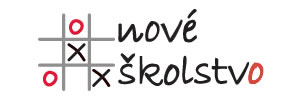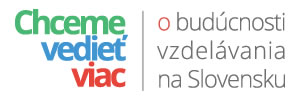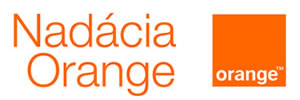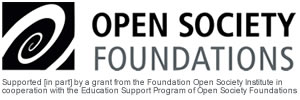Trends
A fundamental skill to be mastered by each child is the ability to learn and to know how to apply what is learned in practice. Compulsory education not only focuses on the acquisition of knowledge and skills, but also performs a socialization role in the spirit of shared values. The growing importance of non-formal learning in children of different ages and in children learning along with other generations also affects the form of primary education. The boundaries between work-based and leisure-oriented learning are being blurred.
Challenges
How is lifelong, non-formal and intergenerational learning going to change the scope, contents, methods, and organization of education in traditional schools? In what ways does primary education align the principles of freedom of choice and equal opportunities? Who will be providing and managing primary education and who will be monitoring its quality?
| Imagine a FUTURE, in which: | Imagine a FUTURE, in which: | Imagine a FUTURE, in which: |
| COMPULSORY EDUCATION LEADS TO A FREE CHOICE OF OPPORTUNITIES THAT A PERSON ALSO CREATES FOR THEMSELVES | COMPULSORY EDUCATION LEADS TO COMBINING INDIVIDUAL INTERESTS WITH THE NEEDS OF THE WIDER COMMUNITY | COMPULSORY EDUCATION LEADS TO IDENTIFYING INDIVIDUAL CAPABILITIES TO BE USED FOR THE BENEFIT OF SOCIETY |
| The common core is a short-term intensive course for individuals. The most important learning environment remains in a family and the preferred method of learning is individual discovery and self-study. | The common core is a several-year-long practical learning in informal groups. The most important learning environment is a community and the preferred method of learning is joint project work. | The common core is a longstanding formal education following generally binding curricula. The most important learning environment is an educational institution and the preferred method of learning is knowledge transfer and skill development. |
| The common core focuses on developing basic reading and digital literacy and mathematics skills. Special emphasis is placed on creativity and promoting the innovativeness of learners. | The common core focuses on developing basic literacy and life skills. Special emphasis is placed on learners' flexibility and cooperation. | The common core focuses on comprehensive personality development and basic literacy competencies while the more advanced compulsory education aims to develop specific skills. Special emphasis is placed on voluntary activities and active citizenship. |
| In addition to the common core monitored by the state, education is a matter of individual lifestyle and family tradition. There is a wide range of commercial providers of continuing education, which usually happens online. Paid education is tailored to the needs of children and is provided by specialists from different areas. | The common core is regulated by the government but communities are free to expand it with their own specifics. Beyond compulsory education, communities provide a variety of practical courses, which differ across communities. In addition to free local education, there is a range of online, mostly commercial, courses. | The common core is provided in a standardized form by educational institutions. Flexible practices are applied that take into account the diverse needs of learners and their progress. Primary education is followed by mandatory specialization studies. To place individuals in specific areas of study, the government uses centrally assigned and assessed tests and forecasts for developments in the labor market. |
| The government checks compliance with standards for common core and the results. With further education, the government only monitors the transparency of the conditions for access to education and the fulfillment of obligations towards customers. | The government monitors the primary education provided by the community and its results. In the field of continuing education, the government guarantees compliance with the applicable legislation, particularly with respect to human and children’s rights. | The government manages, finances, provides for, and evaluates primary and specialized education through a network of its own institutions. Educational results are stored in a central registry. |
| Brick-and-mortar schools common in 2015 have been replaced by digital classrooms for pupils from the most socially disadvantaged groups who do not have access to the necessary technology. Compulsory education is given primarily online and is evaluated using standardized tests of basic literacy and competencies. | Brick-and-mortar schools common in 2015 have been converted into multi-purpose community centers, which provide compulsory education but also a wide range of educational and social services for all age groups. Compulsory education is implemented mostly through group learning and is evaluated by external assessors. | Brick-and-mortar schools common in 2015 have been transformed to complex institutions of mostly residential type to provide early care, primary education, and specialized education up until adulthood. Learning is being evaluated by complex tests of competencies. |
OUR RESEARCH
In the future, education will be different than today, and will probably take place at different locations at the same time. That is the opinion of up to 68% of people. Education is going to remain compulsory and the school as an institution will most likely not disappear. That education is not going to be compulsory in 25 years is an opinion held only by 14% of people.
However, the role of the government in education will decrease, in the opinion of 34% of people, while 43% believe it will remain the same. The government should carry the responsibility for the content of education and ensure its quality in all schools. That is the opinion of 55% of citizens of Slovakia. Up to three quarters of people think that education is intended to enable a person to establish themselves in competition with others.
Almost everyone (90%) considers education to be an important entry ticket to the labor market. Specialization for a future profession should not start in primary schools, which are there to provide children with the common core and moral values. Children may specialize later (69%).
The idea of measuring the quality of compulsory education through uniform testing does not have much support in Slovakia. Indeed, less than a third of the population is convinced of the importance of standardized testing. More than 40% of people think that the quality of schools is reflected more in the gradual progress of its pupils that need to be monitored individually.
Teachers should work with all pupils, not just the most promising ones (59%). The idea of diversity of children in the classrooms is welcome and people think that smart children should not be separated from weaker ones (58%). According to 43% of people, schools should be developing in close cooperation with parents, representatives of the municipality, and other schools. On the other hand, the school and the family are still seen as separate worlds. Only a third of people think that parents should take a more active approach and interest in the school life of their children and should try to influence what happens to them in school. Only a quarter believe parents should be able to influence instruction directly.
OTHER RESEARCH
Standardized testing 9 at age 14 used to not only verify the knowledge of 9th graders in schools but also to collect other data. It showed, for example, that the worse socio-economic status of the pupils’ families, the worse results the children achieved. The tipping point beyond which results start to deteriorate very rapidly is the unemployment rate of more than 16% in the district. The worst results in the test of mathematics were achieved by pupils from districts with a rate of unemployment ranging between 20-30%.1
„It is important to begin to make a distinction between mandatory school attendance and compulsory education.“ workshop participant in the city of, Žilina
In Slovakia, teachers identified nearly 60,000 "troubled" pupils that they were unable to cope with without professional assistance. The finding comes from a survey in which approximately 75% of all primary schools participated. Of those, three quarters confirmed the presence of such pupils in their classes. In most cases, the issues are behavioral, learning, or communication disorders, and the effects of social disadvantage of the child's family, but also specific issues related to gifted pupils. As can be seen, the category of "troubled pupil" covers a wide range of children. The survey also revealed that up to 37% of the "troubled" pupils get no professional help in school.2
„I do not know of such a parent who would put their child into a school where all the children are together.“ a workshop participant in the city of Banská Bystrica
n primary schools in OECD countries, one pupil in eight repeats a grade at least once while it is one pupil in five in the group of pupils from socially disadvantaged backgrounds. However, the OECD warns that repetition of a grade is not a suitable way to improve the performance of pupils who lag behind. It is considered much more effective to strengthen the interest of teachers in pupils who do poorly, to provide the space and time for teachers to give them more attention and adapt instruction to their needs and abilities. 3
GOOD TO KNOW
British researchers have published six principles, which provide the key to good student results: 1. (Pedagogical) content knowledge, 2. Quality of instruction, 3. Classroom climate, 4. Classroom management, 5. Teacher beliefs, 6. Professional behaviors.4
„What is absolutely the most important thing to change in our schools? You just have to believe it, truly believe, that every child can improve. We can start trying to adopt this change of perspective on the child and this change in school culture right away, without the need to put more money into the system.“ Zdeněk Slejška, EDUin
„How is a parent going to know whether their child is progressing at school without marks?“ a workshop participant in the town of Šamorín
Researchers from Harvard University have attempted to statistically correlate the quality of the teacher with the quality of life of their students in adulthood. They found that the better the teacher one has in primary school, the better their quality of life in adulthood. After a thorough statistical analysis of all the available data, and taking into account different socio-economic and demographic characteristics, they found that students with higher quality teachers are doing better in life than their peers. They graduate from prestigious universities much more often, show more responsibility in starting a family, and they save substantially more for retirement during their productive age.5
„Today, children learn only to get the marks. If marks were not assigned, they would take it easy. This is what we have taught them. If we had not assigned them marks from the very beginning, they would not even know that marks exist. It could work differently. They need a different motivation.“ a workshop participant in the city of Košice
Primary schools in New Zealand are gradually being transformed into what is called a community space that responds to the needs of children, respects the surrounding nature, and offers opportunities for meet-ups of entire families. These principles have also impacted the change of curriculum and architectural modifications of schools. Closed classrooms are being interconnected to create open spaces, where up to 100 pupils work at the same time in flexible groups under the guidance of several teachers. In this way, pupils are able to work more together and benefit from the advice of more than just one adult. It turns out that in the open, collaborative environment, the discipline of pupils improves and teachers cooperate more and learn from each other. 6
„Many of the children in our school are socially disadvantaged. We also have children from foster families and children who live only with their grandmother or grandfather. Or their parents have multiple jobs to make ends meet, and have no time for the children. Then we have kids who need praise and care. They not only need to be explained the learning points, but also given help in addressing the problems that trouble them. They need a lot of encouragement, understanding and patience.“ Jarmila Hesterová, teacher
Footnotes
[1] Národný ústav certifikovaných meraní vzdelávania (2014) Testovanie T9-2014 – priebeh, výsledky, analýzy. Bratislava. Dostupné ako pdf.
[2] Výskumný ústav detskej psychológie a patopsychológie (2015) Komplexný poradenský systém prevencie a ovplyvňovania sociálno-patologických javov v školskom prostredí. Dostupné na https://www.komposyt.sk/
[3] OECD (2014) Are disadvantaged students more likely to repeat grades? In PISA in Focus, Vol. 43, 09/2014. Dostupné ako pdf.
[4] Coe, R. et.al. (2014) What makes great teaching? Review of the underpinning research. London: The Sutton Trust. Dostupné ako pdf.
[5] Chetty, R., Friedman, J. N., Rockoff, J. E. (2013) Measuring the Impacts of Teachers II: Teacher Value- Added and Student Outcomes in Adulthood. NBER Working Paper No. 19424. Cambridge: National Bureau of Economic Research. Dostupné ako pdf.
[6] Tesar, M. (2015) Ako sa učí na Novom Zélande, In Týždeň, 6.7.2015. Dostupné na: http://www.tyzden.sk



